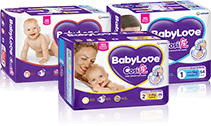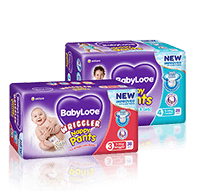Taking your Premature Baby Home
Finally! You get to take your little one home. This long awaited for day is charged with many emotions, which is totally normal. You may be happy to have your baby out of the hospital and simultaneously scared to have your baby at home.

Finally! You get to take your little one home. This long awaited for day is charged with many emotions, which is totally normal. You may be happy to have your baby out of the hospital and simultaneously scared to have your baby at home. After all, caring for a premature baby is not an easy feat, but it can be done. Together with special insight from the Miracle Babies Foundation and the team at BabyLove, you will be basking in the love your precious new (and quite ahead of time) baby awakens within you.
Moving from hospital to home
Now that your little one is discharged from the Neonatal Intensive Care Unit (NICU) and at home with their family, you may need a few quick tips to make the transition a little smoother:
Nesting before the BIG day
After spending a considerable amount of time at the hospital, certain units have the option of staying the night in a private room, which is especially set aside so that you and your partner can spend some private quality time with your bub before you take him/her home. This will give you a glimpse of what it will be like to care for your baby at home. Essentially, this little dry-run serves to not only create a deeper bond between you and bub, but it also serves to boost your confidence.
Breastfeeding – a rich source to essential nutrients
Breastfeeding can be tricky in general, as not every baby latches on immediately to mum’s breast. That trickiness doubles when it comes to premature babies, as they tire easily and require up to 8 or 9 feeds a day. This means that parents have to watch out for their little one’s feeding cues and to respond to them whenever their baby displays them. A good feeding schedule is to feed your baby every 2 to 4 hours. Another useful point is to continue expressing your milk 2 to 3 times a day – this will maintain your milk supply. And in time, as your precious one grows, they will begin to suck more effectively at your breast.
*Challenge: Premmies sleep a lot; getting them to stay awake long enough might make a substantial feed more difficult.
Bathing Basics
With any newborn washing is not necessary every day, with a premmie, in particular, bath-time can be 3 – 4 times a week. The simple top-and-tail method, using a face cloth soaked in warm water to gently wipe your little one will be enough. Bathing should always take place in a warm room and have a towel nearby to wrap bub up in; so that they don’t get cold.
Dressing during the early days
Babies born before their due date are significantly smaller than full-term babies. This is where a customised wardrobe will be a beneficial addition to your little fashionista’s development. It’s true their smaller bodies make finding clothes for them seemingly difficult. However, there are several online shops which provide quality clothing with your baby in mind. Dress them in clothes which are gentle against their skin, comfortable and easy to get on as well as off.
Learn Basic First Aid
Most CPR talks to parents in a hospital setting are not accredited, which is why parents are advised to do the St John’s Ambulance course, Caring for Kids. Basic first aid is a valuable skill to have and acts as good preparation for any potential serious events. If your little one has breathing difficulties and needs an oxygen machine or an apnoea monitor it is a good idea to become better acquainted with that particular medical equipment. So if you hear any alarming sounds or see something that does not look right you will be able to help yourself and essentially your baby.
Avoiding Infections
The risk of developing serious illness is increased when it comes to premmies, as their immune systems are not strong enough to fight off all germs. A premature baby’s first form of defence is their mum’s breastmilk. Packed with antibodies, breastmilk is an excellent way for bub to strengthen their immune system. Another good way to avoid infections is to stop anyone with a cold or the flu from being near your baby. And following basic hygiene practices such as washing your hands on a regular basis is a good point of action to take for anyone who touches your little one.
These tips should better prepare you, as well as your family, for your baby’s return home. Although, if it ever becomes just a little too much for you, do not hesitate to reach out to Miracles Babies Foundation for support.
It is Australia’s leading organisation supporting premature and sick newborns, their families and the hospitals that care for them. Their primary goal is to support and help families and their newborns at every stage of their journey to achieve better, healthier outcomes.
- NurtureLine® – a national 24-hour helpline (1300 622 243)
- NurtureTime® – in hospital parent support sessions
- NurtureGroup® – out of hospital play and support group
Miracle Babies work in partnership with healthcare professionals, advocacy for families, creating meaningful communities that empower families and children to reach their potential and to drive innovation and quality towards better outcomes.
And just in case you’re still feeling a bit anxious, trust that your baby is going home because it’s time for the next part of your journey. So believe in yourself, and remember normal is a relative term; which is great because you’re discovering what is normal for your family.
Breastfeeding your Premmie
Having an in-built resource of highly nutritious and recommended food for your baby is one of biology’s many perks. Having that perk become a successful one is an entire different factor within the realm of motherhood, especially when your baby is born prematurely. But don’t worry because BabyLove together with the Miracle Babies Foundation are honoured to guide you through this special occasion in your premature baby’s life.
And there is nothing quite as special as bonding with your baby while you’re feeding them, whether it’s through breastfeeding, tube-feeding or bottle-feeding, your milk is vitally important to your premature baby. Speak to your nurse as early as possible about assistance with expressing your breastmilk so your baby can receive your breastmilk even if it is too early to breastfeed.
The Benefits of Breastfeeding
Breastmilk has a major advantage over formula. It contains antibodies that will protect your baby against infections which their immune system cannot fight off. This is especially important for your premmie’s growth.
Benefit 1: Your milk adapts to your baby’s premature status. This means that the colostrum that you produce will be richer in proteins than that of a mum who carried her baby to full-term. Your breastmilk will contain more fat and less lactose, as premmies have difficulty in digesting lactose.
Benefit 2: Babies who are breastfed have a decreased risk of respiratory infections, asthma, inflammatory bowel disease, gastroenteritis, childhood leukaemia and lymphoma to name a few.
Benefit 3: It could also improve your baby’s cognitive development, mum-bub attachment and reduce your baby’s chances of being readmitted into hospital. It also has shown to improve the neurodevelopmental results within premmies.
Benefit 4: Mums who breastfeed have a reduced occurrence of anaemia, a prolonged return of menstruation and a lower incidence of pregnancy. They also have a reduced occurrence of Type 2 diabetes, which is good news particularly for women who suffered from gestational diabetes.
Benefit 5: Breastfeeding has been shown to reduce the risk of SIDS. This is specifically beneficial to premature babies, who have a higher chance of cot death.
Benefit 6: Breastfeeding is also quite special, as it is something only you can provide your baby. Remember to keep pumping every 2 to 3 hours to keep up your milk supply.
It is true that breastmilk is the better choice for your baby; however breastfeeding may not always be possible. This is where pre-term formula comes in. This formula is specially developed to fulfil your premature baby’s specific needs. Premmies require formula that contains higher levels of iron, fat, protein, calcium, phosphorous, magnesium and several other vitamins. These special formulas will help your baby grow faster. Your team of healthcare professionals will recommend the most appropriate one for your baby.
Whether you choose to feed your baby breastmilk, formula or a combination of the two, ultimately you are doing more than nourishing your baby’s body. You are also nourishing your baby’s spirit (feeding creates an intimate bonding moment), which is certainly essential for a premature baby. Your little fighter has the greatest gift of all – you. So go easy on yourself and remember to nourish yourself as well; a healthy mum and dad are champion cheerleaders for any premmie.




